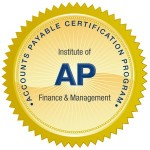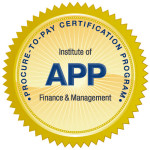
- Membership
- Certification
- Events
- Community
- About
- Help
IOFM receives a lot of questions about the process for correcting 1099 filings, and even whether a correction is necessary in the first place. In this podcast, we speak to Jason Dinesen about the circumstances under which it might be necessary to issue one. What if the recipient’s name was spelled wrong? What if the dollar amount or a TIN number was incorrect? What if a check was never cashed? And what should your approach be for correcting a 1099 if the recipient simply requests it?
Jason also explains the importance of filing a correction by the deadline, and the method by which it must be filed, whether electronically or in paper form. He adds that the consequences of failing to correct errors or for issuing too many incorrect 1099s in the first place can result in fines for each mistake, an amount which can become consequential for a large organization that produces a lot of these forms.
Listen now to discover must-know information about how to meet your filing obligations and avoid the financial impact and IRS scrutiny that comes from non-compliance.

Jason Dinesen
Jason is a tax nerd, entrepreneur, tax expert and a well-known presenter of continuing education courses. Known for his sharp tax interpretations, he is one of the quickest to bring the analysis of the latest tax updates and IRS guidance to the professional community. Jason has coached over 200,000 accounting, tax, and HR professionals on various topics of accounting, individual taxation, corporate taxation, professional ethics and much more.
He has presented over dozens of webinars on Form 1099 (for 10 years on this subject!); marriage in the tax code; tax updates; the new Form W-4, payroll updates, filing status, tax credit and other issues relating to the modern-day household setting. He also teaches on Individual Income Tax and Business Analytics. Jason always had a knack for radio shows and has and regularly features as an anchor for Radio Iowa. Jason was born and raised in Iowa and has a degree in corporate communications from Simpson College in Indianola, Iowa.

Royce Grayson Morse
Royce Grayson Morse has been working with IOFM for the past eight years, writing and editing content about Accounts Payable, Accounts Receivable, automation, and industry trends. She has worked on the IOFM Certification Guides and written the associated examinations; edits the annual 1099 and 1042 Master Guides; conducts podcasts; and manages the IOFM.com website content.
Grace Chlosta: Welcome to the IOFM podcast. This is a podcast for accounts payable and accounts receivable professionals who want to stay in the know with current AP and AR trends and ideas. We'll be interviewing professionals in this space on a wide variety of subjects, including automation, artificial intelligence, career growth, compliance, leadership, and much more.
Today we'll be interviewing Jason Dinesen. Jason is a tax nerd, entrepreneur, tax expert, and a well-known presenter of continuing-education courses. Known for his sharp tax interpretations, he is one of the quickest to bring the analysis of the latest tax updates and IRS guidance to the professional community. Jason has coached over 200,000 accounting, tax, and HR professionals on various topics of accounting, individual taxation, corporate taxation, professional ethics, and much more.
00:01:00
He has presented over dozens of webinars on Form 1099 for ten years on this subject, marriage and the tax code, tax updates, and new Form W-4, payroll updates, filing status, tax credit, and other issues relating to the modern-day household setting. He also teaches on individual income tax and business analytics. Jason always had a knack for radio shows, and regularly features as an anchor for Radio Iowa.
Jason was born and raised in Iowa, and has a degree in Corporate Communications from Simpson College in Indianola, Iowa. He'll be interviewed by Royce Grayson Morse, Managing Editor for IOFM.
Royce Grayson Morse has been working with IOFM for the past eight years, writing and editing content about accounts payable, accounts receivable, automation, and industry trends. She's working on the IOFM Certification Guides and written the Associated Examinations, edits the Annual 1099 and 1042 Master Guides, conducts podcasts, and manages the IOFM.com website content.
00:02:02
Royce Morse: Hi, Jason, and thanks for joining us today.
Jason Dinesen: Well, thanks for having me. It's good to be here again.
Royce Morse: Yeah. I always enjoy talking to you. So today I want to talk about a topic that is near and dear to our member's hearts, and that has to do with corrections, typically 1099 corrections. We get a lot of questions about them, a variety of questions, but sometimes there's a theme, so I kind of want to talk about those things, and it may help people understand the types of things that need to be corrected (and what doesn't need to be corrected), how to correct it and what happens if you don't correct it, and anything that's relevant to the correction process.
00:02:49
Let's talk first about why you might need to correct a 1099 that you misreported to the IRS or there was a problem with. What are some situations in which that would occur?
00:03:03
Jason Dinesen: This is for 1099s and for W-2s. The rules are the same for both. You're required a complete and accurate form by the due date, so by January 31, and we're talking filing with the IRS here. So it's your W-2s and your 1099 NECs, although what we're talking about actually applies to any type of 1099, so 1099 Miscellaneous. There's 21 different types of 1099s. This applies to any type of 1099. Whatever the due date is — so January 31 for your W-2s and the NEC 1099s (or whatever other due date for other forms) — the law says the form must be complete and accurate.
00:03:59
So if you file a form with an error on it, the IRS could say that the form is not complete and accurate and hit you with a failure-to-file penalty. That gets into a different discussion of penalties and how often do penalties get assessed. That gets us down a whole different road, Royce. I've talked to accountants who say they've been practicing for 30 years, and they hardly ever see the IRS assess 1099 or W-2 penalties, but then I talk to other people who say, "I see those penalties all the time."
00:04:46
Does the IRS have consistency on this? Maybe, maybe not, but the bottom line is they could penalize you if there's an error on the form, so that's why you file a correction as soon as you spot an error. We can talk about this more in a little bit, but with both W-2s and 1099s, if you file the correction by August 1 and the number of forms that you're correcting is ten or less in most situations — technically, it's the greater of ten forms or one-half of one percent, so 0.005 forms that you filed. In most cases, for your average small business, it's going to be ten. If it's ten or less, you are not penalized at all as long you get the correction in by August 1.
00:05:49
So that's why you file corrections is to avoid penalties with the IRS, which can range from $60 on up to $330, depending on how long it takes you to get a corrected form in to the IRS.
Royce Morse: I see. Interesting. So what are some situations in which you would need to file a correction? We have had some questions about that, and I have some examples, but I'd like to hear what, in your practice, you find most frequently.
Jason Dinesen: Not everything necessarily needs to be corrected. That's one of the things. Don't panic. I answered the first question about "why file corrections," and the answer is you file corrections if you spot errors because you could be penalized if you don't correct an error, but not every error necessarily needs to be corrected.
00:07:00
There are certain things that the IRS cares about and certain things that the IRS does not care about. Let's talk first about what they don't care about. These are things you don't have to correct. Wrong first names — and I guess we can come back to why that is that you don't need to correct a wrong first name, in just a little bit, because you do need to correct wrong last names, so hold that thought on why first names you don't need to correct. If you mess up somebody's first name, you're actually not required to correct that.
00:07:43
And then you have wrong addresses. The IRS does not care if the address on the form is wrong, and that because when it comes to the recipient and the IRS logging what their address is, they don't use the address on these information forms. They use the address on that person's tax return, so like their person 1040 for your individual contractor or employee, or the entity return if it's a corporation of some sort or a partnership that's filing. It's whatever tax return is filed is what the IRS looks at for the address.
Your information form you do not need to correct. Now, of course, you should update your system if you notice that the first name is wrong or an address is wrong. Update your system so that next year the form that goes out has the correct information, just for appearance's sake basically and professionalism and all of that, but it's not something you need to correct with the IRS.
00:08:56
And then you have what's called de minimis dollar errors. A de minimis dollar error means small dollar amount errors. That's what the term "de minimis" means. A de minimis dollar amount error is an error that is less than $25 when it comes to tax withholding, so tax withholding on the W-2 or backup withholding on the 1099 — so that's box 4 of 1099 NEC or 1099 Miscellaneous tax withholding, if done. If the dollar amount is wrong on the form that you filed, but it's less than a $25 error, you don't have to correct.
00:09:48
For all other dollar amounts, like what you're putting in the box, [like] box 1 of 1099 NEC, if the variance is less than $100, you are not required to file a correction. Those are the big three where you do not need to correct: wrong first names, wrong addresses, and then small dollar amount errors.
Before we got further and talk about the situations where you do correct, I should say that if the recipient of the form comes to you and says, "I want a corrected form," then you do need to file a correction if they request one. But you are not obligated, as far as the IRS is concerned, to file a correction if it's a wrong first name, wrong address, or a de minimis dollar amount error.
00:10:48
Then we get into the situations where you do need to file corrections, and there's three things here. These are in no particular order — well, I guess they're in the order that they're in the instructions from the IRS.
An error relating to dollar amounts that are not de minimis — so a dollar amount error for tax withholding that's more than $25, or more than $100 for other dollar amounts and other boxes — those you do need to correct.
Wrong last name names and wrong taxpayer identification numbers — so wrong Social Security numbers or EINs. I said I would address why doesn't the IRS care about first names. It's because if you look in publication 1281, which is all about Social Security number errors and EIN errors, missing taxpayer ID numbers, doing backup withholding, responding to CP2100 letters, the IRS talks in publication 1281 about how they do computer matching.
00:12:14
These forms go into the IRS' computers and their computers then log these things. The computers then watch the recipients of these forms to make sure that they are reporting all of their income honestly when they file their tax return. The way that the IRS logs 1099s and W-2s for individuals is they look at the first four characters of the last names, like the first four letters of the last name, plus the taxpayer identification number. Their computers do not look at first names, so that's the reason why you are not required to correct first names, but you are required to correct last names and Social Security numbers.
00:13:16
Now, I'm kind of just rambling here, Royce, but I did want to add one more thing on the subject of Social Security number errors. What we're talking about here when we say an error with Social Security numbers needs to be correct — this is if you discover the error before you receive a CP2100 letter from the IRS, which is usually sent — they send a wave in April and then another wave in September/October.
00:13:51
Last year, 2023, they were a little early, I perceived, on sending out CP2100 letters. It was like September 20 or so when they sent them out. CP2100 letters are different. If it's the IRS notifying you that there was a Social Security number problem, you do not file corrections in that situation. Instead, you follow the CP2100 process of B notices and all of that to get your records updated.
What we're talking about here with filing corrections with taxpayer ID numbers is if you discover an error, or you send a 1099 to a contractor and they come back to you and say, "Hey, you transposed a number on my Social Security number," well, now you know that there's an error before you received a CP2100 letter, so you need to correct that then by filing a correction.
00:14:51
Royce, that was like a ten-minute, rambling answer to your question, but I think that that addresses all of the reasons why you would want to file a correct, when you do need to file a correction, and when you don't need to file a correction.
Royce Morse: Interesting. So what about checks that were never cashed, like unclaimed property? Do you report those? How do you handle that?
00:15:18
Jason Dinesen: That's an interesting question. That's been asked in "Ask the Experts" before. I've gotten it in webinars before. On so many of these things, the IRS doesn't necessarily provide a lot of guidance. In fact, I've never seen it anywhere where the IRS has addressed this issue.
00:15:45
Let's back up. The short answer is this: You issued the check, say, in 2023 — this really is what the question is. You issued the check in 2023 to a contractor, and they never cashed it. Now it's 2024, and they're saying, "Hey, you never cashed this check." Or, "I never got paid by you," and you say, "Well, I wrote you a check." Well, they never cashed it. That's the issue here. How do you do the reporting?
The short answer is it's still a 2023 item because that's when you wrote the check for payment is 2023, so by including it on a 1099 in 2023, that was appropriate. So what you do is you contact your bank and put a stop payment on that old check, and then issue a new check in 2024, but you would not put that on a 2024 1099. It's still a 2023 item; it's just a payment that you're making again now. So you would not need to file a correction in that situation.
00:17:01
Royce Morse: So you don't need to report it twice, in other words.
Jason Dinesen: Correct. You don't report it twice because you've already made the payment in 2023. You're simply reissuing the check in 2024.
Royce Morse: What other situations should people be aware of where they have an obligation to file?
Jason Dinesen: One thing that comes up every now and then as questions — I think this has been another "Ask the Experts." I mean, who are we kidding? I think almost anything that we talk about has probably been asked at some point or another in "Ask the Experts." I've been asked this in the webinars that I teach as well, and sometimes I just get random emails even from people asking this, about corrections: How do you file the correction?
00:17:52
Specifically, it's like, "Well, I mailed in my 1099s, so how do I file the corrections," and especially now with all the changes on electronic filing, and you have the e-file mandate now for your 2023 forms, which is ten or more. Here's what you do. When you need to file a correction — and this applies to 1099s and W-2s — however you filed the original form is how you file the correction. So if you mailed in, on paper, the original form and now you need to do a correction, you're going to mail in the correction; whereas, if you e-filed the original form, then you must e-file the correction.
00:18:48
Royce Morse: That makes a lot of sense. Any other thoughts for us?
Jason Dinesen: I think that basically covers it when it comes to filing corrections. You do it because you're trying to avoid penalties from the IRS, and as long as you get those corrections in by August 1 — that, by the way, is the day of August 1. It's not July 31. It is August 1. As long as you file corrections by August 1, you will generally avoid penalties then that could happen if you don't file corrections.
Royce Morse: Great. Thank you so much, Jason. I appreciate your thoughts, and look forward to speaking with you again.
Jason Dinesen: Well, thank you. It was good to be here, and I look forward to being here again down the road. Thanks so much.
Grace Chlosta: Thank you so much for listening to the IOFM podcast. Remember to head on over to the Member Forum to discuss today's episode and provide ideas for our next one. And to stay up to date on IOFM's current events, both in-person and virtually, head on over to IOFM.com.
Continuing Education Credits available:
Receive 1 CEU per hour of listening time towards IOFM programs:

 Receive 1 CEU per hour of listening time towards maintaining any AP and P2P related program through IOFM! These programs are designed to establish standards for the profession and recognize accounts payable and procure-to-pay professionals who, by possessing related work experience and passing a comprehensive exam, have met stringent requirements for mastering the financial operations body of knowledge.
Receive 1 CEU per hour of listening time towards maintaining any AP and P2P related program through IOFM! These programs are designed to establish standards for the profession and recognize accounts payable and procure-to-pay professionals who, by possessing related work experience and passing a comprehensive exam, have met stringent requirements for mastering the financial operations body of knowledge.
Continuing Education Credits available:
Receive 1 CEU per hour of listening time towards IOFM programs:

 Receive 1 CEU per hour of listening time towards maintaining any AP and P2P related program through IOFM! These programs are designed to establish standards for the profession and recognize accounts payable and procure-to-pay professionals who, by possessing related work experience and passing a comprehensive exam, have met stringent requirements for mastering the financial operations body of knowledge.
Receive 1 CEU per hour of listening time towards maintaining any AP and P2P related program through IOFM! These programs are designed to establish standards for the profession and recognize accounts payable and procure-to-pay professionals who, by possessing related work experience and passing a comprehensive exam, have met stringent requirements for mastering the financial operations body of knowledge.
What are you waiting for?
